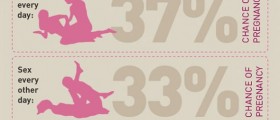I went to the doctors an they told me my periods were normal but im starting to think differently because i dont usually last 10 days on a period dates.
In January my period was for 5 days on Jan 15th
then i had 8 days off then on wednesday 28th Jan i came on my period for 10 days %-) an told my doctors this an now im confused :-( because i think i will be on again at the end of the month, can neone tell me if this is normal or not??
thanks for reading
Aimzi xx
In January my period was for 5 days on Jan 15th
then i had 8 days off then on wednesday 28th Jan i came on my period for 10 days %-) an told my doctors this an now im confused :-( because i think i will be on again at the end of the month, can neone tell me if this is normal or not??
thanks for reading
Aimzi xx
Loading...
Weird i know- do you take any medications? That can affect your periods. I seem to have a period every two and half weeks, but I am 35 they last 5-8 days and the next one may last 2 days. My gyno say this is ok too.
Loading...
Suffering from irregular periods is a fairly clear indication that your cycles have become imbalanced. There are a variety of reasons for this and also many ways to address the imbalance. Many women are unconcerned about having irregular cycles until they begin trying for a baby, but other women find it very difficult to plan without knowing when their periods could appear.
Irregular periods are simply those that are not regular. If you suffer from irregular periods, you simply will not know when your period is going to appear. Cycles can vary from 23 to 35 days, but they are classed as regular if your periods occur at roughly the same time each cycle. So, even if your periods are, say, 35 days apart instead of the usual 28, but they always appear at day 35, they would be classified as being 'normal'. Irregular periods can be extremely difficult or even impossible to track.
Minor cycle irregularities are common. For example, you may have your period on day 23 of one month and then the next month on day 35.
You may, however, have a much more irregular cycle, in which case it is important that you have further investigations, so that other problems, such as polycystic ovary syndrome (see polycystic ovary syndrome section) can be ruled out. The following symptoms are characteristic of irregular periods, and you can experience a combination of any or all of these:
1. Large gaps with no periods
2. Some gaps and then periods coming too frequently for a while (for example, two in one month) followed by gaps again.
3. Gaps of no periods and then bleeding continuously for a few weeks.
4. Spotting in between period.
**edited by moderator**
Irregular periods are simply those that are not regular. If you suffer from irregular periods, you simply will not know when your period is going to appear. Cycles can vary from 23 to 35 days, but they are classed as regular if your periods occur at roughly the same time each cycle. So, even if your periods are, say, 35 days apart instead of the usual 28, but they always appear at day 35, they would be classified as being 'normal'. Irregular periods can be extremely difficult or even impossible to track.
Minor cycle irregularities are common. For example, you may have your period on day 23 of one month and then the next month on day 35.
You may, however, have a much more irregular cycle, in which case it is important that you have further investigations, so that other problems, such as polycystic ovary syndrome (see polycystic ovary syndrome section) can be ruled out. The following symptoms are characteristic of irregular periods, and you can experience a combination of any or all of these:
1. Large gaps with no periods
2. Some gaps and then periods coming too frequently for a while (for example, two in one month) followed by gaps again.
3. Gaps of no periods and then bleeding continuously for a few weeks.
4. Spotting in between period.
**edited by moderator**
Loading...















